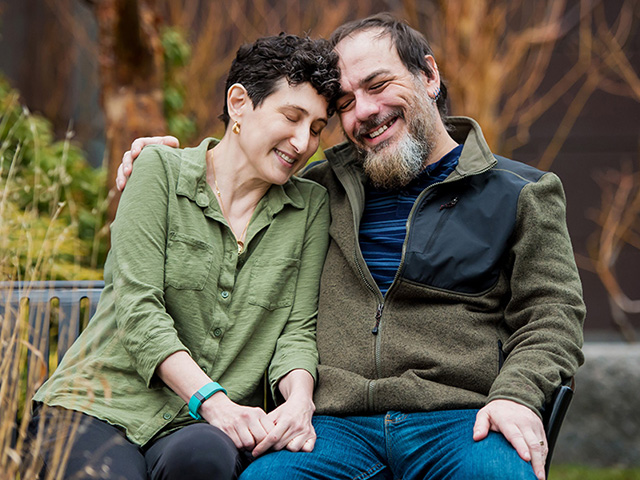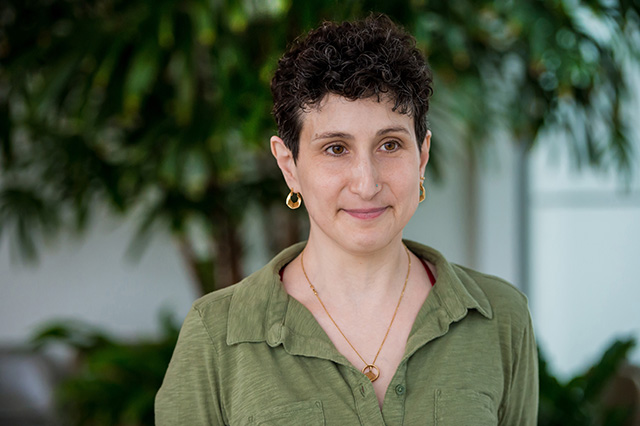Patient StoryMar | 5 | 2018
Stefanie London and Jonathan Reich


The Cancer Center’s Story Project is an effort to capture stories from our community of patients, friends, family, clinicians, and staff who have been affected by cancer in some way. This is Stefanie and Jonathan's Story.
- Stefanie and Jonathan have relied on the support of the Psychiatric Oncology department here at the Mass General Cancer Center to help get through Stefanie’s breast cancer diagnosis, and want to change the way that a cancer diagnosis is viewed in the mental illness community.
- "When I feel like I can’t do something, when my depressive thoughts come, I remember that I had chemo and I got through that. I kept going."

What have you learned about yourself since diagnosis?
Stefanie:
“When I was diagnosed, it was a couple of months after Jonathan’s sister had been diagnosed, and I had been hearing about what she was going through, her chemo and double mastectomy and all of that, and I was thinking ‘wow, that’s amazing strength that she has, she has three children.’ I never thought it would happen to me; I don’t have family history, and then I was diagnosed. It was hard at first, it was really hard to accept and get my head around it. Although I’ve been in the hospital multiple times for psychiatric reasons, I had never been in the hospital for medical reasons; the thought of having surgery was daunting to me. It was also difficult to tell people, tell my family and friends. As Jonathan reminded me, there were some reactions, because it was breast cancer, that minimized it. People would say ‘well, oh you’ll be fine, because this person and that person had breast cancer and they’re fine, so you will be too.’ Some people were more sympathetic. But I think both reactions were well-intentioned. One thing I learned is that everybody’s experience is going to be different, and cancer’s just hard, no matter what type you have and what your outcome is expected to be. Your outcome could always change. I didn’t think I was going to have to have chemo. I found out after my surgery that I was going to have to have chemo and radiation, and that was a huge surprise to me and I had to accept that. Luckily, I had Jonathan’s sister to call and text, she is a physician, she could tell me what things were like. I had great support and information, I was very fortunate to have her as a resource. I also had a really good support for my depression at this time.”
“My doctors wanted to make sure I was as strong as I could be to face the oncoming experiences. They collaborated with the psychiatric oncologist here, Dr. Kelly Irwin. It was a huge help to have that connection between the doctors. I think it should always be a part of cancer care, to have that support, whether the person has a mental illness or not. In the case of coming into the diagnosis with depression, it was really important that there was someone in the hospital here who was able to suggest medications, to check with my other doctors on medications I would be taking, when it was safe for me to have it, all of that. I was very fortunate with that.”
“In terms of how I’ve changed, it’s changed how I think about myself, about my identity. I’m a person who has cancer now; it’s part of my identity, but how much of that forms who I am? I’m trying to find the balance between that and how I felt before. And also having to find the balance between what I expect from myself. I practice yoga, and for a few weeks after surgery I had to stop. But I kept going through chemo, I was still going. It was always helpful for my mental health, and moving around was also helpful physically after treatment. It gave me some confidence in my body, knowing I could still do things. I had confidence in my recovery. There were times when I couldn’t do something that I could a year before and I have to accept that and be ok with that. I think that is a very formative experience because you are where you are, just learn to be where you are in that day. It makes you let go of the past and just keep looking forward and staying in the moment. I think the concept of that really increased the importance of knowing that I need to be kinder to myself when I can’t do something. It’s a hard thing to practice, but I still try. That applies to my depression as well.”
How has it been finding the new normal?
Stefanie:
“That was hard, after the treatments are over. The treatment took up our whole lives and all the scheduled appointments, it just provides all this structure and it was fully my identity. I was a patient. When I finished radiation and got to ring the bell outside of radiation, that part of me was over and I had to look at things a different way.”
Have you felt like this whole experience has changed your outlook or how you live your life?
Stefanie:

“It gave me some positive things to reference. It was a very hard experience. But when I feel like I can’t do something, when my depressive thoughts come, I remember that I had chemo and I got through that. I kept going. It was ok. You can do it. When I feel sad, when I think things in the world and the people in the world are bad, and the future doesn’t look good, I remember all that I went through and all the good. When I was sick my temple coordinated to bring Jonathan and I food so we wouldn’t have to cook after surgery. People who didn’t even know me did this huge thing for me, and there is good in this world, and I was a recipient of it. I can think of times after surgery that the nurses were really supportive. I had a meltdown and one nurse sat with me and supported me and got me through it. I remember those things and that changes my outlook. I feel really fortunate, I have things to be grateful for, for my husband, I don’t know how I could have done it without Jonathan. He was with me every step of the way, not just taking me to appointments and sitting beside me when I had chemo, but was supportive constantly. Everything I needed, getting me there and giving me injections, all the nitty-gritty of everything. I know not everyone has someone like that involved to support them, and I feel very fortunate. I feel fortunate for the amount of healing my body did, and I go into yoga class and I think I might not be able to do everything today but I’m really grateful of the gift of being here at all, and I think of those who can’t be here and I dedicate my practice to that. It gives meaning to my practice and it makes me grateful for what I can do.”
“I have bad days, and when sometimes I look back on this experience, this horrible thing that happened to me, I think more horrible things can happen. And at least half of the time I can bring myself back and think of all I went through. And my clinicians say to me ‘you are strong, look what you did. You can get through it and get through this too.’"
Jonathan:
“I always knew Stefanie was strong, and strong enough to handle what was thrown at her, but it was good to see Stefanie learn that. There’s such a stigma with cancer, it’s such a scary word. But at the same time nobody ignores it, they might minimize it by saying ‘my cousin had that and turned out ok.’ As opposed to mental illness, where someone might say ‘oh I can’t do that today, I’m feeling really depressed’ a lot of times people don’t really respect that in the same way someone would respect ‘oh I can’t today, I’m feeling really exhausted from Chemo.’ You know, nobody would say ‘oh come on, lets go.’"
Stefanie:
“That comparison really drove home for me how much stigma there is for mental illness. Again, the fact that they’re coordinating my psychiatric care with my outside providers, it made my life so much easier. It makes so much sense. I don’t know if it’s always done that way. It really prevented me from having a depressive episode this past year, people had my back, made sure I got through it ok. It made a huge difference. Our outlook on things, our mood, affects our bodies, our behaviors. If you’re trying to fight a disease, you need as much of your strength, your mental fortitude as you can, addressing that is really important.”
Stefanie LondonWhen I feel like I can’t do something, when my depressive thoughts come, I remember that I had chemo and I got through that. I kept going.
This interview took place on April 5, 2017 and has been edited for clarity.
Related Programs
Type
Centers and Departments
Topics
Patient Stories
View inspiring cancer survivor stories from Mass General Cancer Center’s community of patients, families, and staff.
Supportive Care Services
Our support programs can help patients and their families cope with the challenges of a cancer diagnosis.
